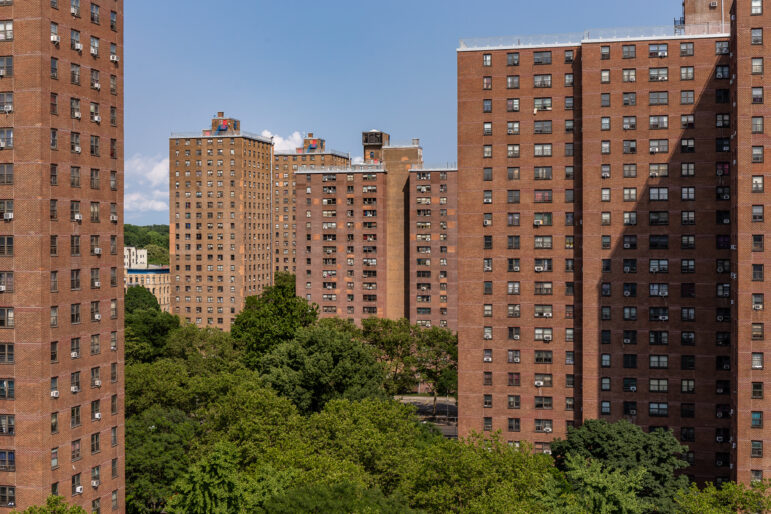After a more than year-long push from lawyers with the New York Legal Assistance Group (NYLAG), the housing authority is publishing all of its regulations in one document, which will be publicly available for the first time—and tenants and stakeholders have until next month to weigh in on the rules.

Adi Talwar
NYCHA’s Claremont Village in the Bronx.
For New York City residents living in public housing, there’s a wide-ranging set of legal rules and procedures that govern their tenancy—for how their rent is set, how they can add household members to their lease, what violations could put them at risk for eviction and more.
But until last week, many of those policies were shrouded in secrecy, outlined piecemeal across different documents or available only through Freedom of Information requests, attorneys who represent NYCHA tenants say.
After a more than year-long push from lawyers with the New York Legal Assistance Group (NYLAG), the housing authority is publishing all of its regulations in one document, which will be publicly available for the first time—and tenants and stakeholders have until next month to weigh in on the rules.
NYCHA on Wednesday published a draft version of its new Admissions and Continued Occupancy Policy (ACOP), which details rules around things like tenant applications, rent calculations, transfers, recertifications and lease terminations, similar to the Rent Stabilization Code that governs rent-regulated housing in New York.
“[It’s] a huge step forward in terms of having a more participatory, transparent housing authority,” said Anna Luft, project director at NYLAG’s Public Housing Justice Project, where she represents tenants before NYCHA’s Office of Impartial Hearings, where termination of tenancy cases—the first step in the eviction process—are adjudicated.
For years, Luft said, the lack of a publicly available ACOP made it more difficult for her and other attorneys to defend NYCHA tenants facing potential termination, since it was hard to determine what the specific rules were. Residents can be terminated for a broad array of violations, including having an unregistered pet, failing to re-certify their income, or failure to occupy their apartments for a period of time, which Luft says she’s seen used against a client staying in a rehab facility post-surgery.
Tenants can also face termination if they’re arrested, even without a conviction, or if they commit other behaviors deemed a danger or nuisance to others, what NYCHA refers to as “non-desirability”—compounding the impact of policing in public housing, where communities already face disproportionate surveillance and enforcement, Luft argues.
“NYCHA is at the intersection of the housing court system and the criminal legal system,” she said. “To keep those policies from [tenants] just exacerbates and perpetuates the underlying systemic racism inherent in the police system.”
The ACOP’s publication will also make it easier to keep tabs on NYCHA rules when they’re changed. For example, about a year ago, according to NYLAG, the housing authority updated its procedures around securing succession rights—when another member of the household takes over the lease if the tenant of record dies. Attorneys only learned of the change, they said, after a resident took a photo of a half-torn notice posted in the lobby of their building and sent to an organizer, who then shared it more widely.
While the regulations detailed in the ACOP only apply to tenants who live in Section 9 housing, NYLAG is advocating for the housing authority to expand it to include policies governing NYCHA units that have been converted to Section 8 under the RAD/PACT initiative, which is expected to cover some 62,000 public housing apartments by 2028.
Tenants and the public can submit feedback on the ACOP via email or snail mail until Oct. 28. A final version is expected to be released at the start of 2024.
“We are really encouraged that NYCHA is accepting comments on [the ACOP] and we really want to encourage anyone, members of the public, anyone who’s interested, to consider submitting comments,” said Kate Fetrow, a senior staff attorney in NYLAG’s Special Litigation Unit. “It’s really maybe a once in a lifetime opportunity to do that.”
To reach the reporter behind this story, contact Jeanmarie@citylimits.org.

